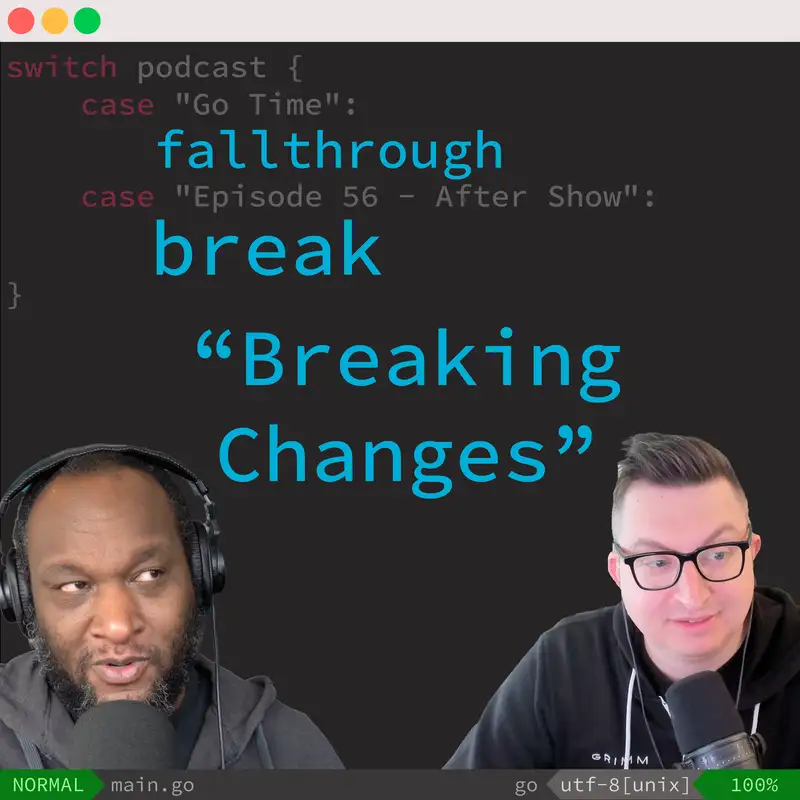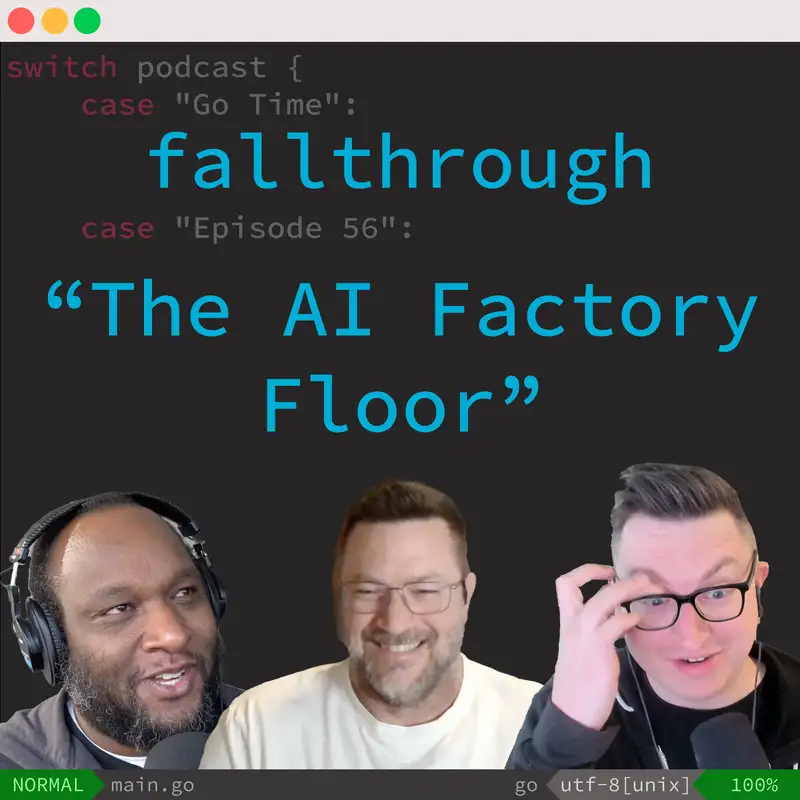IndieWeb post types
This content type is full of IndieWeb post types, which are all content types which allow me to take greater ownership of my own data. These are likely unrelated to my blog posts. You can find a better breakdown by actual post kind below:
Listened to
a post on the-github-podcast.simplecast.com
Listened to
What's in the SOSS? An OpenSSF Podcast

Post details
What's in the SOSS? features the sharpest minds in security as they dig into the challenges and opportunities that create a recipe for success in making software more secure. Get a taste of all the ingredients that make up secure open source ...

Listened to
a post on the-github-podcast.simplecast.com
Post details
Between and I took 2706 steps.
Listened to
Break | Breaking Changes

Post details
Welcome back to Break, a Fallthrough aftershow! It's just Kris and Steve for this one! After brief reflections on the Gastown discussion, the episode pivots into a deep dive on semantic versioning,...

Listened to
Fallthrough | The AI Factory Floor

Post details
This week we're talking about Gastown! Dylan and Steve join Kris to break down the viral project that spins up hundreds of Claude Code instances to build a software factory. Steve makes the case fo...

Liked
demon grrl 😈🏳️⚧️ (@demongrrl.gay)

Post details
BAHAHAHAHAHAHAHAHAHAHAHAJAHAHAHAHAHAHAHAHAHAHAHAHAHAHA *breathes* AHAHAHAHAHAHAHAHAHAHAHAHAHAHAAHAHAHA

Liked
tierney cyren (@bnb.im)

Post details
After all the turmoil and pain we’ve collectively suffered so Disney could keep their hands on Mickey Mouse’s copyright, it’s pretty jarring to get ads on TikTok for “AI companions” of Elsa doing the TikTok thirst coreo to CHANEL by Tyla with boob physics in a Santa outfit
Between and I took 12025 steps.
Liked
Rich Burroughs (@somewhattolerable.com)
Post details
This author has chosen to make their posts visible only to people who are signed in.
Listened to
The state of homelab tech (2026) with Techno Tim (Changelog & Friends #125)

Post details
Techno Tim joins Adam to dive deep into the state of homelab'ing in 2026. Hardware is scarce and expensive due to the AI gold rush, but software has never been better. From unleashing Claude on your UDM Pro to building custom Proxmox CLIs, they explores how AI is transforming what's possible in the homelab. Tim declare...
Reposted
Brittany Ellich (@brittanyellich.com)

Post details
If these CAPTCHAs get any harder I'm not sure I'm going to be able to pass them 😅
Liked
Ian Coldwater 🧊🚫 (@lookitup.baby)

Post details
I keep being like “oh fuck I need to do this” and then not being up for doing it and I’m so mad
Between and I took 6121 steps.
Liked
GitHub - gjtorikian/paty: The most human-like AI agent you'll ever use. It insists on manners, gets distracted mid-task, sometimes gives up entirely, occasionally claims it did something when it didn't, ignores its own output, and starts every session already feeling a bit off.

Post details
The most human-like AI agent you'll ever use. It insists on manners, gets distracted mid-task, sometimes gives up entirely, occasionally claims it did something when it didn't, ignores it...
Liked
HerRoyalThighness (@ourflagmeansbeth.bsky.social)
Post details
This author has chosen to make their posts visible only to people who are signed in.
Liked
HerRoyalThighness (@ourflagmeansbeth.bsky.social)
Post details
This author has chosen to make their posts visible only to people who are signed in.
Liked
stardust and anxiety (@visualglitch91.com)
Post details
This author has chosen to make their posts visible only to people who are signed in.
Liked
tierney cyren (@bnb.im)

Post details
Rust people are so unserious lmfao

Listened to
Natural born SaaS killers (Changelog & Friends #126)

Post details
We discuss the buzz around Clawdbot / MoltBot / OpenClaw, how app subscriptions are turning into weekend hacking projects, why SaaS stocks are crashing on Wall Street, and what it all means.
Listened to
OpenAI and Codex with Thibault Sottiaux and Ed Bayes - Software Engineering Daily
by

Post details
AI coding agents are rapidly reshaping how software is built, reviewed, and maintained. As large language model capabilities continue to increase, the bottleneck in software development is shifting away from code generation toward planning, review, deployment, and coordination. This shift is driving a new class of agentic systems that operate inside constrained environments, reason over

Between and I took 7124 steps.
Liked
How to Choose Colors for Your CLI Applications · Luna’s Blog
Post details
Reposted
Renovate (@renovatebot.com)

Post details
Reminder that #Renovate 43 came out yesterday! We landed a few breaking changes, so check out the release notes: https://github.com/renovatebot/renovate/releases/tag/43.0.0
Listened to
Securing npm is table stakes with Nicholas C. Zakas (Changelog Interviews #674)

Post details
As the creator and long-time maintainer of ESLint, Nicholas Zakas is well-positioned to criticize GitHub's recent response to npm's insecurity. He found the response insufficient, and has other ideas on how GitHub could secure npm better. On this episode, Nicholas details these ideas, paints a bleak picture of npm alte...
Liked
ミカル bones (@doctorbones.bsky.social)

Post details
The state of american politics is that one major party wants to kill you while the other simply wants you to die
Listened to
Clawdbot (Moltbot), Agents and the Age of Personal Software - Syntax #974

Post details

Between and I took 9347 steps.
Listened to
Cup o' Go | Happy 3rd birthday, Brewster!

Post details
ProposalsAccepted: direct reference to embedded fields in struct literalsNew: Generic Methods for Go

Listened to
Raising An Agent: Episode 9

Post details
Quinn and Thorsten are back! It's been a while since they published a Raising An Agent episode and in this this episode, they discuss how everything seems to have changed again with Gemini 3 and Opus 4.5 and what comes after — the assistant is dead, long live the factory.

Listened to
Raising An Agent: Episode 8

Post details
In this episode of Raising an Agent, Beyang and Camden dive into how the Amp team evaluates models for agentic coding. They break down why tool calling is the key differentiator, what went wrong with Gemini Pro, and why open models like K2 and Qwen are promising but not ready as main drivers. They share first impressions of GPT-5, explore the idea of alloying models, and explain why qualitative “vibe checks” often matter more than benchmarks. If you want to understand how Amp thinks about model selection, subagents, and the future of coding with agents, this episode has you covered.

Listened to
Raising An Agent: Episode 7

Post details
In this episode, Beyang and Thorsten discuss strategies for effective agentic coding, including the 101 of how it's different from coding with chat LLMs, the key constraint of the context window, how and where subagents can help, and the new oracle subagent which combines multiple LLMs. 00:53 Intros 03:35 How coding with agents is very different from coding with prior AI tools that use chat LLMs 10:46 Example of an agentic coding run to fix a simple issue 14:28 Example of debugging an issue with an MCP server 22:05 Example of unifying two build scripts that share logic 25:24 How context window size has emerged as a key constraint on agentic automation 31:16 Why it's best to focus on one thing at a time per agentic thread 33:24 Subagents and how they help extend the effective context window 34:04 The Amp codebase search subagent 38:48 General-purpose subagents 44:20 When to use subagents 47:04 The oracle subagent and o3 51:47 Multi-model agents and using the best model for each job

Liked
HerRoyalThighness (@ourflagmeansbeth.bsky.social)
Post details
This author has chosen to make their posts visible only to people who are signed in.
Liked
HerRoyalThighness (@ourflagmeansbeth.bsky.social)
Post details
This author has chosen to make their posts visible only to people who are signed in.
Between and I took 4536 steps.
Liked
Post by somewhat tired mouse in its bed, @algernon@come-from.mad-scientist.club

Post details
@JadedBlueEyes@tech.lgbt I recently learned that GitHub allows one to view the activity on a repo, and you can limit it to [show force pushes only](https://g…

Listened to
Raising An Agent: Episode 6

Post details
In this episode, Quinn and Thorsten discuss Claude 4, sub-agents, background agents, and they share "hot tips" for agentic coding.

Liked
Luke Steuber (@lukesteuber.com)
Post details
This author has chosen to make their posts visible only to people who are signed in.
Reposted
Imani Gandy (@angryblacklady.blacksky.app)

Post details
I'm legit unfollowing people who never use alt text. You're literally typing on a text based app. So why are you making Canva images with little pithy quips and no alt text. I honestly don't understand it.
Listened to
Raising An Agent: Episode 5

Post details
In this episode, Beyang interviews Thorsten and Quinn to unpack what has happened in the world of Amp in the last five weeks: how predictions played out, how working with agents shaped how they write code, how agents are and will influence model development, and, of course, all the things that have been shipped in Amp.

Between and I took 4639 steps.
Reposted
Hazel Weakly (@hazelweakly@hachyderm.io)
Post details
The two hardest problems in Computer Science are 1. Human communication 2. Getting people in tech to believe that human communication is important
Liked
a post on mastodon.kinlane.com
by
Post details
My personal newsletter for last week. A day late, but yesterday was a struggle after the weekend in the United States. …(https://mastodon.kinlane.com/@kin/115967203544698336)
Liked
Jade (@JadedBlueEyes@tech.lgbt)
Post details
Cloudflare just published a vibe coded blog post claiming they implemented Matrix on cloudflare workers. They didn't, their post and README is AI generated and the code doesn't do any of the core parts of matrix that make it secure and interoperable. Instead it's littered with 'TODO: Check authorisation' and similar https://blog.cloudflare.com/serverless-matrix-homeserver-workers/
Liked
Jan Lehnardt :couchdb: (@janl@narrativ.es)
Post details
Look, all of these can be true: - the fosdem organisers cannot be trusted to enforce a CoC violation - they have no covid safety concept that would allow at-risk folks to attend safely - open hard- and software is the only way forward in this increasingly enshittified and enclosed software world - the list of people I’d love to meet who are attending is a mile long - building communities is more important than ever while the forces in power enshrine divide and conquer into the fabric of our societies - meeting in-person is effective to forge new bonds and deepen existing relationships - we must continue to demand better from organisers - see you on Brussels
Liked
jb, sharkey edition (@jb)

Post details
Did someone post something? It's on mastodon.social. It's literally on booping.synth.download. It's maybe in wetdry.world. It's literally on gts.apicrim.es. You can probably find it on app.wafrn.net. Dude it's on shrimp.starlightnet.work. It's a infosec.exchange original. Check out mas.to for it. You'll find it on hachyderm.io. It's definitely on oomfie.city. Look for it on tech.lgbt. It's over on yeen.town. You can see it on waf.moe. It's been shared on akko.wtf. Go peek at fuzzies.wtf. It's trending on transfem.social. You can catch it on eepy.moe. Browse over to lethallava.land. It's on $INSTANCE$host$. You can read it on $INSTANCE$host$. You can go to $INSTANCE$host$ and like it. Log onto $INSTANCE$host$ right now. Go to $INSTANCE$host$. Dive into $INSTANCE$host$. You can $INSTANCE$host$ it. It's on $INSTANCE$host$. $INSTANCE$host$ has it for you. $INSTANCE$host$ has it for you.
Reposted
jb, sharkey edition (@jb)

Post details
Did someone post something? It's on mastodon.social. It's literally on booping.synth.download. It's maybe in wetdry.world. It's literally on gts.apicrim.es. You can probably find it on app.wafrn.net. Dude it's on shrimp.starlightnet.work. It's a infosec.exchange original. Check out mas.to for it. You'll find it on hachyderm.io. It's definitely on oomfie.city. Look for it on tech.lgbt. It's over on yeen.town. You can see it on waf.moe. It's been shared on akko.wtf. Go peek at fuzzies.wtf. It's trending on transfem.social. You can catch it on eepy.moe. Browse over to lethallava.land. It's on $INSTANCE$host$. You can read it on $INSTANCE$host$. You can go to $INSTANCE$host$ and like it. Log onto $INSTANCE$host$ right now. Go to $INSTANCE$host$. Dive into $INSTANCE$host$. You can $INSTANCE$host$ it. It's on $INSTANCE$host$. $INSTANCE$host$ has it for you. $INSTANCE$host$ has it for you.
Listened to
Raising An Agent: Episode 4

Post details
Thorsten and Quinn talk about the future of programming and whether code will still be as valuable in the future, how maybe the GitHub contribution graph is already worthless, how LLMs can free us from the tyranny of input boxes, and how conversations with an agent might be a better record of how a code change came to be than git commit tools. They also share where it works and simply doesn't work.

Listened to
Raising An Agent: Episode 3

Post details
Quinn and Thorsten start by sharing how reviews are still very much needed when using AI to code and how it changes the overall flow you're in when coding with an agent. They also talk about a very important question they face: how important is code search, in its current form, in the age of AI agents?

